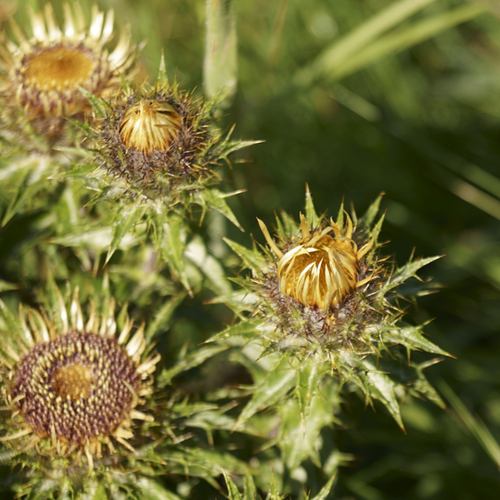
Carlina
Scientific names: Carlina acaulis
Family: Asteraceae/Compositae
Alternate names: Artichaut Sauvage, Baromètre du Berger, Camaleón, Caméléon Blanc, Carciofo Selvatico, Cardabelle, Cardo Dorado, Carline Acaule, Chardon Argenté, Chardon Doré, Chardonnette, Dwarf Carline, Eberwurz, Gardabelle, Ground Thistle, Little Thistle, Piccolo Cardo, Racine de Carline Acaule, Radix Cardopatiae, Radix Chamaeleontis Albae, Silberdistelwurz, Southernwood Root, Stemless Carlina Root, Wild Artichoke
Background
Carlina is an herb. The roots are used to make medicine.
Carlina is used for gallbladder disease, indigestion (dyspepsia), wound healing, toothache, and many other conditions, but there is no good scientific evidence to support these uses.
Carlina is used for gallbladder disease, indigestion (dyspepsia), wound healing, toothache, and many other conditions, but there is no good scientific evidence to support these uses.
Safety Safety definitions
When taken by mouth: There isn't enough reliable information to know if carlina is safe or what the side effects might be.
When applied to the skin: There isn't enough reliable information to know if carlina is safe or what the side effects might be.
Allergy to ragweed, daisies, and related plants: Carlina may cause an allergic reaction in people who are sensitive to the Asteraceae/Compositae plant family. Members of this family include ragweed, chrysanthemums, marigolds, daisies, and many others. If you have allergies, be sure to check with your healthcare provider before taking carlina.
When applied to the skin: There isn't enough reliable information to know if carlina is safe or what the side effects might be.
Special Precautions & Warnings:
Pregnancy and breast-feeding: There isn't enough reliable information to know if carlina is safe to use when pregnant or breast-feeding. Stay on the safe side and avoid use.Allergy to ragweed, daisies, and related plants: Carlina may cause an allergic reaction in people who are sensitive to the Asteraceae/Compositae plant family. Members of this family include ragweed, chrysanthemums, marigolds, daisies, and many others. If you have allergies, be sure to check with your healthcare provider before taking carlina.
Effectiveness
NatMed Pro rates effectiveness based on scientific evidence according to the following scale: Effective, Likely Effective, Possibly Effective, Possibly Ineffective, Likely Ineffective, Ineffective, and Insufficient Evidence to Rate.
Insufficient evidence Effectiveness definitions
- A long-term disorder of the large intestines that causes stomach pain (irritable bowel syndrome or IBS).
- Bed sores (pressure ulcers).
- Cold sores (herpes labialis).
- Foot sores in people with diabetes.
- Gallbladder disease.
- Genital herpes.
- Indigestion (dyspepsia).
- Infection of the intestines by parasites.
- Leg sores caused by weak blood circulation (venous leg ulcer).
- Toothache.
- Wound healing.
- Other conditions.
Dosing & administration
The appropriate dose of carlina depends on several factors such as the user's age, health, and several other conditions. At this time there is not enough scientific information to determine an appropriate range of doses for carlina. Keep in mind that natural products are not always necessarily safe and dosages can be important. Be sure to follow relevant directions on product labels and consult your pharmacist or physician or other healthcare professional before using.
Interactions with pharmaceuticals
It is not known if Carlina interacts with any medicines. Before taking Carlina, talk with your healthcare professional if you take any medications.
Interactions with herbs & supplements
There are no known interactions with herbs and supplements.
Interactions with foods
There are no known interactions with foods.
Action
Some extracts of carlina might work by killing bacteria, yeasts, and parasites.
vital.ly has licensed monographs from TRC Healthcare.
This monograph was last reviewed on 30/03/2023 11:00:00 and last updated on 15/10/2020 23:14:27. Monographs are reviewed and/or updated multiple times per month and at least once per year.
Natural Medicines disclaims any responsibility related to medical consequences of using any medical product. Effort is made to ensure that the information contained in this monograph is accurate at the time it was published. Consumers and medical professionals who consult this monograph are cautioned that any medical or product related decision is the sole responsibility of the consumer and/or the health care professional. A legal License Agreement sets limitations on downloading, storing, or printing content from this Database. No reproduction of this monograph or any content from this Database is permitted without written permission from the publisher. It is unlawful to download, store, or distribute content from this site.




